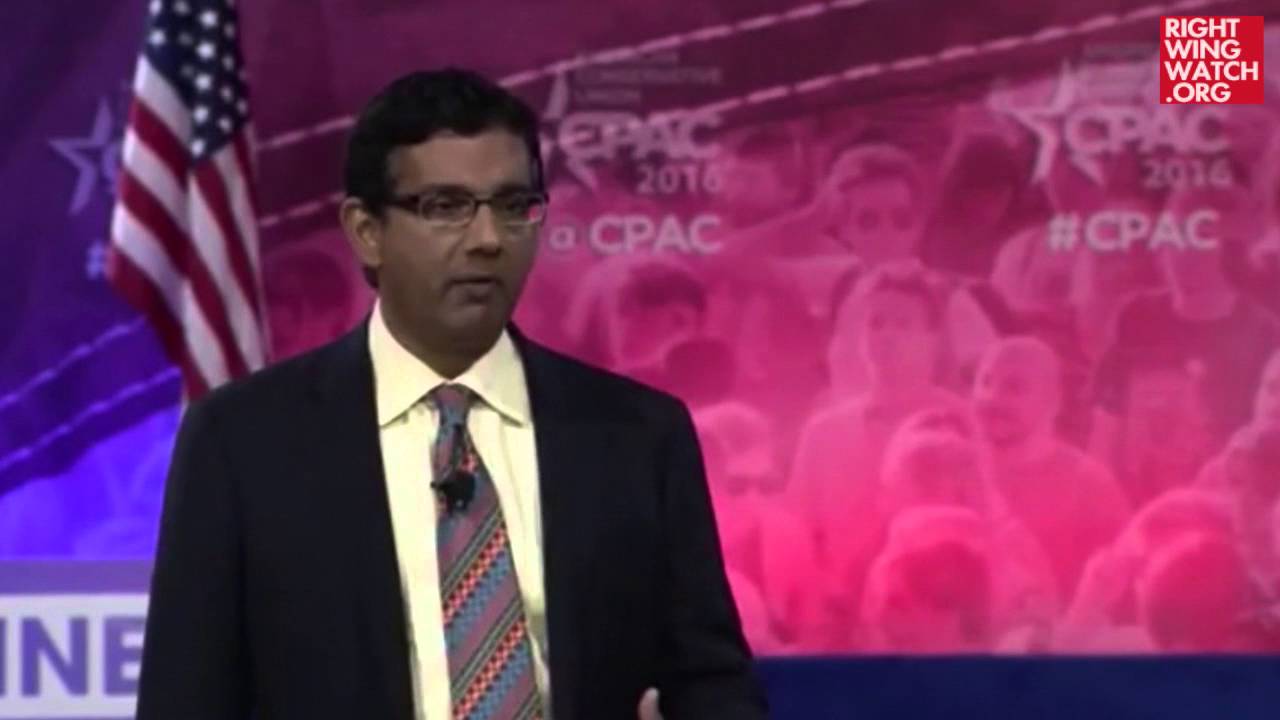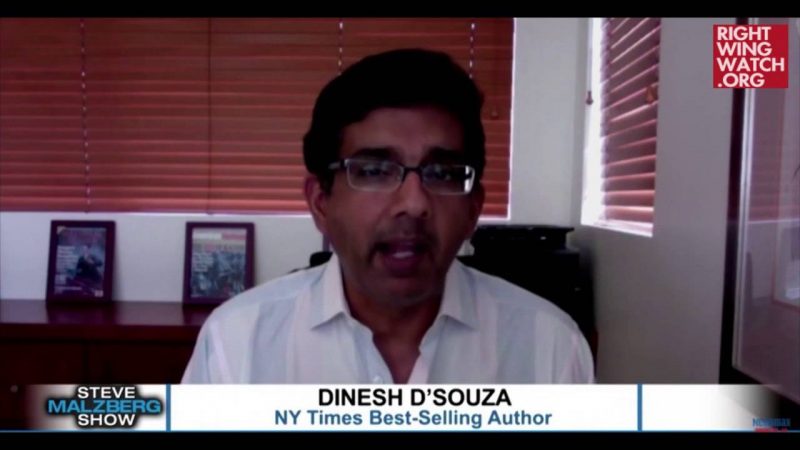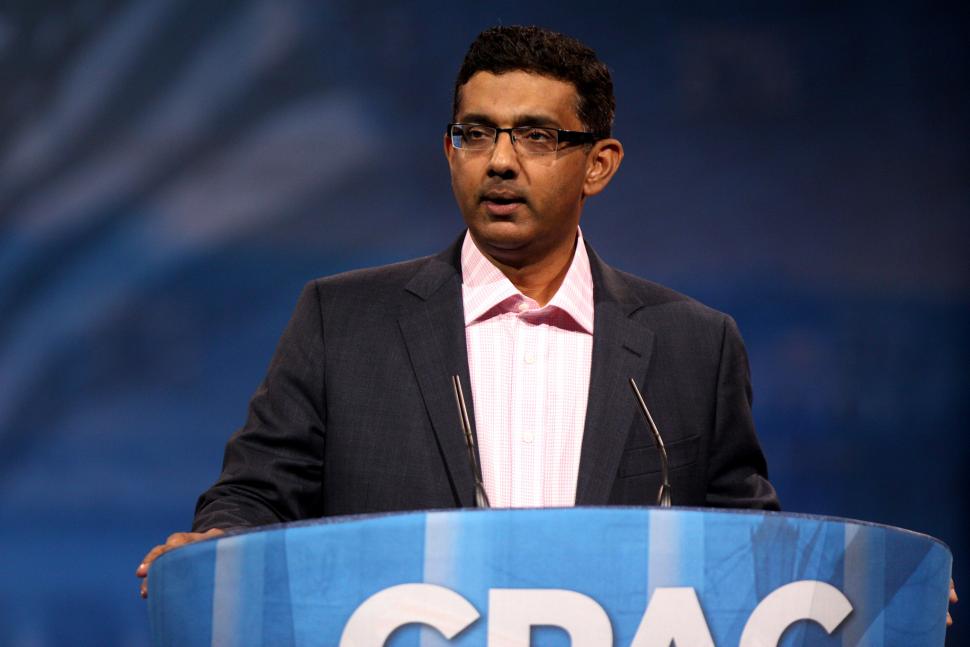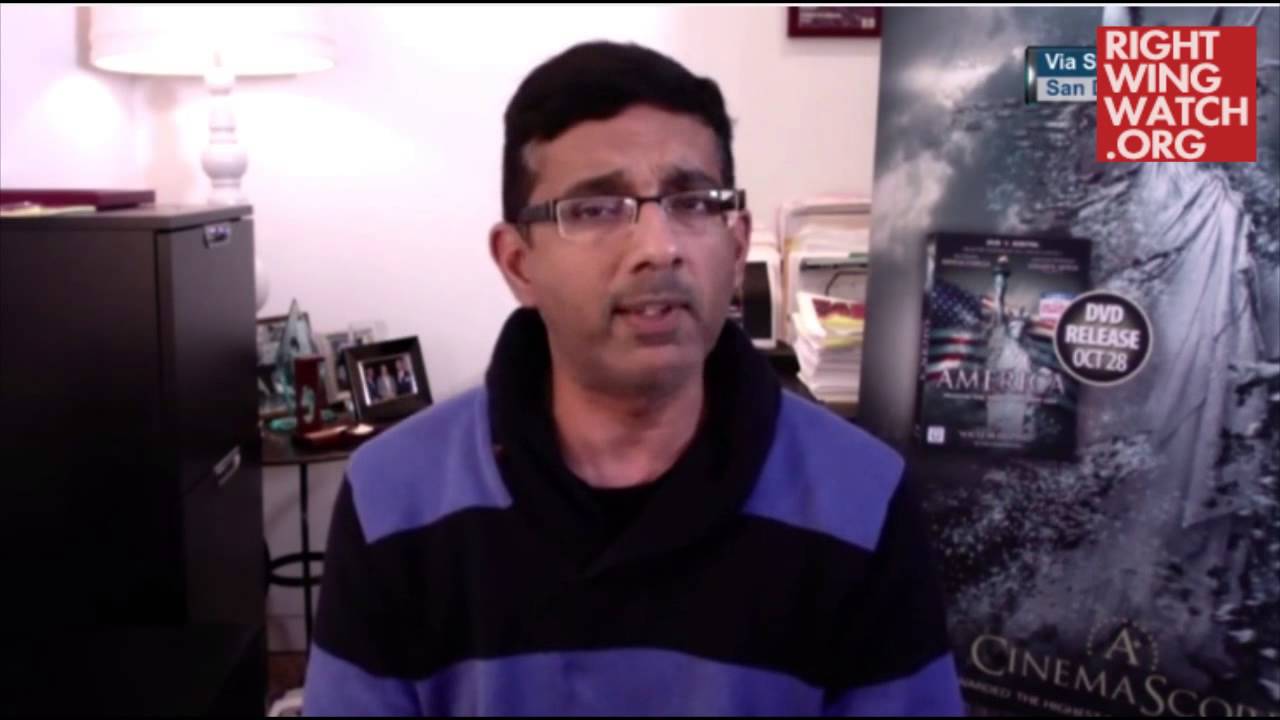This week Dinesh D’Souza’s “America: Imagine the World Without Her” is sitting at the top of the New York Times “nonfiction” bestseller list. Earlier this month, the movie version crossed the $14 million dollar mark, which moved it into six place overall for earnings by a political “documentary.”
But D’Souza is not just out to make money, of course. At a June screening of “America,” right-wing strategist Ralph Reed called D’Souza “a national treasure for our cause.” D’Souza’s last movie, “2016: Obama’s America,” was designed to keep Barack Obama from being elected. “America” is an attempt to prevent Hillary Clinton from being elected in 2016, wrapped in an attack on the progressive movement.
At a time when corporate power and profits are at record highs, “America” the movie argues that America the country is being led down the road to national “suicide” and socialist tyranny in a plan that was conceived by organizer Saul Alinsky and is being carried out by Barack Obama and Hillary Clinton. Central to this long-term leftist scheme to bring about American decline has been an effort to convince Americans to be ashamed of the country’s history so that they will support a reduced role for America in the world.
In the movie, D’Souza sets out to refute progressive “indictments against America: We stole the country from the Native Americans, we stole the labor of the African Americans, we took half of Mexico in the Mexican War. Today our foreign policy and free market system are forms of theft.” D’Souza says this “new story of American shame” is “not just an attack on the one percent. It’s an attack on all of us. We are a nation of immigrants and settlers and we are the ones accused of these crimes.”
D’Souza interviews some leftists and liberals as foils, including Noam Chomsky, Ward Churchill, and Michael Eric Dyson, and turns to Alexis de Tocqueville, writing more than 150 years ago, as a “more reliable” source. De Tocqueville understood, D’Souza says, that slavery and the treatment of Native Americans were nothing unique to America, but reflected a universal “conquest ethic.” Throughout history, he says, wealth was built by conquest and theft. But America is uniquely based on a different idea – the idea of acquiring wealth not by taking it from someone else but through innovation, entrepreneurship and trade.
In the process of taking on these progressive “indictments” of American history, D’Souza essentially tells Native Americans, African Americans, and Mexican Americans that in the big picture they really have nothing to complain about, and could be successful if they were just willing to work rather than spending all their time complaining.
D’Souza is proud of himself for being willing to take on racial taboos, which he calls “the enemies of history and truth.” His point seems to be that African Americans were not uniquely abused by slavery and so they should stop thinking the country owes them something. Yes, he says, enslavement was theft of life and labor. But Irish people were also sold into indentured servitude. And some free blacks also owned slaves. Slave-owning founders should not be viewed as hypocrites but as pragmatists who had to accept slavery as the price of creating the U.S. And besides, slavery is part of the “universal conquest ethic” but “what’s uniquely American is the fighting of a great war to end it.”
The movie ignores Jim Crow, but tells the story of Madam C.J. Walker, an African American woman who was born just after the Civil War and who became wealthy by building a successful business in the early 20th Century. In the movie, an actress playing Walker lectures workers about freedom and opportunity and hard work. Of course, the movie does not mention her support for the NAACP or her active involvement in its anti-lynching campaigns. D’Souza claims she is left out of history because her success “confounds the shaming narrative.”
D’Souza also interviews Star Parker, a familiar figure at right-wing conferences, whose I-used-to-be-lazy-and-on-welfare shtick suggests that it is only an unwillingness to work hard that keeps people from being successful. In remarks made after the screening, D’Souza said nonwhite immigrants are doing better than African Americans because the latter have adopted a strategy of “agitate, agitate, agitate” rather than “work, work, work.”
In the movie, D’Souza portrays American foreign policy and global capitalism as fundamentally noble. So why are progressives out to destroy America and its place in the world?
The answer is Saul Alinsky. “America” portrays Alinsky as the ruthless mastermind of a plot to bring socialism to America, and Barack Obama and Hillary Clinton as his equally ruthless acolytes. Hillary Clinton turned down a job offer from Alinsky after she graduated from college because she had more nefarious plans. “While Alinsky wanted the radicals to pressure the government, Hillary wanted the radicals to become the government,” D’Souza says. Why shame people from the outside when you can intimidate them from the inside? “Hillary figured it out,” says D’Souza, “Obama is now carrying it out.”
D’Souza wraps up the movie with a disjointed section on the surveillance state. D’Souza says the government is gathering information on all Americans so that it can target political opponents, the way he says the Obama administration has targeted conservatives through the IRS and other agencies. Not very convincingly, he portrays his recent prosecution for violating campaign finance laws – he has pleaded to a felony and faces sentencing in September – as part of this ideological warfare.
All of which is a long way of saying the movie is a jumbled, self-indulgent, right-wing mess, aside from the slanted take on American history. Critics have not been kind to “America,” which has a 9% rating from movie review aggregation site Rotten Tomatoes. Rolling Stone’s Peter Travers put the movie in the “Scum Bucket,” calling D’Souza a “lunatic.”
But plenty of good books have been made into mediocre movies, right? At the screening, D’Souza described the book as the “intellectual spine” of the movie, and said it had been hard to fully communicate all of the book’s ideas and make the movie entertaining.
So, if the book any better? Sadly, no. If anything, D’Souza’s polemics are even more ridiculous and incendiary when he has the space to spell them out. For example, “Today’s progressivism is less indebted to Marx than it is to Lenin.”
D’Souza’s take on race and civil rights is particularly noteworthy given events in Missouri that have focused national attention on the unequal treatment of people of color by police and the justice system.
D’Souza says the Civil Rights movement was hardly revolutionary because racism was already on the decline after World War II. Government-enforced segregation was bad, he acknowledges, because it represented “a triumph of government regulation over the free market.” But private discrimination is not theft and should not have been banned, he says, writing, “Private employers should no more be forced to hire employees than employees should be forced to work for employers against their will.”
“Somewhat weirdly, the Civil Rights Act of 1964 did not merely outlaw discrimination by the government; it also outlawed most forms of private discrimination. While I consider these restrictions on the private sphere to be unwise and unnecessary, they are also understandable.”
D’Souza says the election of Barack Obama, the existence of affirmative action programs, and changing attitudes toward racial intermarriage are all evidence of the continuing decline in racism in America.
“Blacks know it too: ask blacks today to recall when they personally experienced racism—when for example someone called them ‘nigger’—and many are hard pressed to give a single example.”
So there’s no reason for whining about racism, or God forbid, reparations. “Racism today is not strong enough to prevent blacks or any other group from achieving its aspirations,” he says, adding a couple pages later,
“Progressives are still chasing the windmills of old-style racism, whipping the nation into a frenzy every time there is some obscure incident. The reason blacks remain so far behind whites, however, has very little to do with racism. It has to do with African American cultural backwardness.”
Here are some other highlights:
· Obama: “Obama is simply part of a fifty-year scheme for the undoing and remaking of America,” he writes. So how did Obama get elected? “There is a one-word answer: slavery.”
· Clinton: “If Hillary Clinton is elected in 2016, the baton will have passed from one Alinskyite to another. In this case, Alinsky’s influence will have taken on a massive, almost unimaginable, importance. Obama will have had eight years to remake America, and Hillary will have another four or perhaps eight to complete the job. Together these two have the opportunity to largely undo the nation’s founding ideals.”
· Native Americans: “The Indians were here first, but they were only sparsely and sporadically occupying the land. Consequently, many settlers regarded America as largely unoccupied, although the Indians surely disagreed with that perspective. Too bad the two groups could not amicably work out a way to share and benefit from this vast country.” Too bad? “They couldn’t, I believe, because both groups continued to espouse at least elements of the conquest ethic. Neither wished to be taken from, but both were willing to take when they had the power and the inclination to do so.” D’Souza has little sympathy for those “forlorn” Indians who “seem to prefer the joy of victimhood – and the exertions of claiming reparations of one sort or another –to the joy of entrepreneurial striving” – unlike those who are making money with casinos.
· Immigration: “Immigration—legal and illegal—is the mechanism that today’s progressive organizers are counting on to undo the consequences of the Mexican War, and make the dream of Aztlan a reality.”
D’Souza asserts that “in no circumstance over the past hundred years” has America “stolen the wealth of any other country.” It’s not foreigners, but Americans, who are victimized by the federal government, “the biggest thief of all,” he writes. “In fact, progressives have turned a large body of Americans—basically, Democratic voters—into accessories of theft by convincing them that they are doing something just and moral by picking their fellow citizens’ pockets.”
With this line of reasoning, D’Souza aligns himself with the proponents of biblical economics, who argue that the government has no right to tax someone in order to alleviate someone else’s poverty. “It does not promote the common good for the state to insist that successful people pay other people’s medical bills,” he says, describing Obamacare and progressive taxation as forms of theft. Transfer payments, unlike roads, do not constitute “general welfare.” Rather, “It constitutes a forcible extortion from one group and an unearned benefit to another.” The federal government is therefore not an instrument of justice but “an instrument of plunder.”
As in the movie, D’Souza takes time in the book to complain about his own prosecution (even though he admits having broken the law) and to suggest that the current surveillance state is part of the progressive movement’s strategy to impose totalitarianism: “Surveillance is simply the means to ensure that no one is safe.” He writes, “If progressives enforce their agenda through total control and compliance, America will truly be an evil empire, and it will be the right and duty of American citizens to organize once again, as in 1776, to overthrow it.” (Of course, aggressive surveillance began well before the Obama presidency, and progressives have been among those opposing government overreach.)
D’Souza denounces what he says is the progressive plan to diminish America’s influence globally, and closes the book with a warning about what the world might look like when its dominant force is not America but China, whose growing economic power is translating into greater military force and geopolitical influence. Similar concerns may be shared across the political spectrum, but having celebrated China’s adoption of market economics and economic growth, and having defended the export of American manufacturing jobs to cheap-labor China – trends that cannot be blamed on the Obama presidency –D’Souza does not make it clear what he would have American leaders do to forestall China’s rising influence. If he has a solution, he’s keeping it to himself.
The same can be said for the plight of unemployed and underemployed American workers. It doesn’t matter that you’re willing to work hard if there are no jobs to be had. And while D’Souza describes inequality as an essential element of the free market economy, he does not address the fact that in recent decades American workers have received almost none of the benefits of increasing productivity. His lectures to African Americans that their unwillingness to work hard is the only obstacle to their success ignore both evidence of continuing impacts of structural racism – reflected for example in exploitive mortgage underwriting – and the brutal consequences of the recent economic downturn on the already huge disparities of wealth between white and African American (and Latino) households.
The facile ideology of “America: Imagine the World Without Her” – both book and movie – should be no surprise. D’Souza’s entire career, beginning with his work at the right-wing Dartmouth Review and continuing through stints at the Heritage Foundation and American Enterprise Institute, has been nurtured by far-right funders. His claim to being a “scholar” is grounded in his authorship of a series of polemical books, including “The Roots of Obama’s Rage,” an exercise in ideological excess that even some conservative commentators found embarrassing. He champions traditional values, but in 2012 he resigned as president of the Christian King’s College after news that he had traveled with, and become engaged to, a woman who was separated from but still married to her husband. Like his old friend Ann Coulter, D’Souza has learned that there is seemingly no end to the money to be made, and fame to be enjoyed, by repackaging and peddling ideological diatribes to the country’s right-wing activists.








